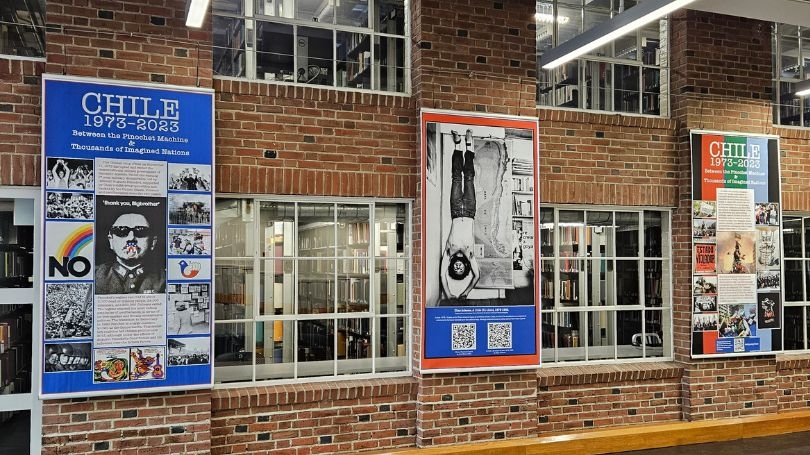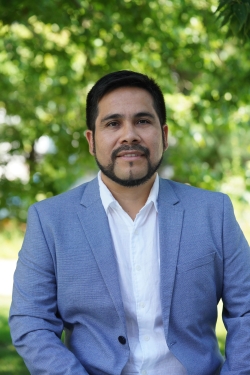

Mellon Faculty Fellow Mauricio Acuña organized an exhibition and three events to foster dialogue on the consequences of the violent military coup on Latin America and the world.
Fifty years ago, decades before 9/11, the people of Chile experienced a tragic September 11 of their own when Augusto Pinochet led a violent coup to overthrow the government of socialist president Salvador Allende. Seventeen years of brutal military dictatorship followed.
Mauricio Acuña, a Mellon faculty fellow in the Department of Spanish and Portuguese, remembers his mother telling him stories about having to leave Chile after the coup.

"She felt tremendous frustration for having to leave the country," says Acuña, who was born in Brazil. "But also, in some ways, both my parents kept believing in the democratic values of the project that took place during that period—social inclusion efforts that happened during the government of Salvador Allende."
This fall, Acuña has organized an exhibition and three events at Dartmouth to mark the commemoration of the 50th anniversary of the coup and explore its contemporary consequences on Latin America and the world.
"We are using the commemoration as a doorway to bring people into a conversation about Chile and what the coup entailed: politics, culture, human rights, and social justice," he says. "To use that moment to talk about that period, and to think about the contemporary issues at stake. We want to capture the interest of students in the Dartmouth community, to discuss and connect such debate with their own interests, feelings, and impressions about politics today, here in the United States and worldwide."
The exhibit—now open to the public at Baker-Berry Library through the end of September—invites viewers to learn about the coup and its consequences on contemporary politics and Chile. Visitors can watch films of speeches, songs, and performances, and examine banners featuring historic and recent images. The banners were created by exhibits and graphic arts designer Dennis Grady.
Each banner features a QR code that links to a resource guide curated by Jill Baron, research and learning librarian for the humanities and social sciences and Latin American specialist. Acuña recently published an article (in Portuguese) that was inspired by the exhibition in Outras Palavras.
On Sunday, Oct. 1, at 7 p.m, the living learning community La Casa, Maria Clara de Greiff, and Acuña will host a Noche de Tertulia y Poesía ("Night of Gathering and Poetry") themed around Victor Jara. Students and faculty will read poetry and listen to music to honor the poet, singer songwriter, and political activist who was shot during Pinochet's coup.
On Wednesday, Oct. 4 at 2:10 p.m., Elizabeth Hochberg, a Spanish professor at the University of Washington and specialist in literature from the period previous to the coup, will give a virtual presentation, "Specters of the End: Sabotage and Coup D'etats in Allende-Era Fiction." The lecture will be recorded and the video will be uploaded with subtitles in Spanish to increase accessibility and inclusivity.
Finally, on Tuesday, Oct. 10 at 6 p.m. in Rockefeller 003, history professor Pamela Voekel will host a Zoom panel entitled "History and Legacies of Chile's September 11, 1973." Panelists include Chilean historian Mário Garcés Durán of the Universidad de Santiago de Chile, the author of multiple works including the influential Tomando su sitio. El movimiento de pobladores de Santiago, 1957-1970; University of Montana historian Joanne (Jody) Pavilack, author of the award-winning book, Mining for the Nation; Alison Bruey, professor of history at the University of North Florida and author of the critically acclaimed book, Bread, Justice, and Liberty: Grassroots Activism and Human Rights in Pinochet's Chile; and Chilean human rights activist Magdalena Garcés Fuentes.
The commemoration activities are sponsored by the Department of Spanish and Portuguese, the Department of History, the Department of Latin America, Latino and Caribbean Studies, Baker-Berry Library, and the Leslie Center for the Humanities. All events are free and open to the public.